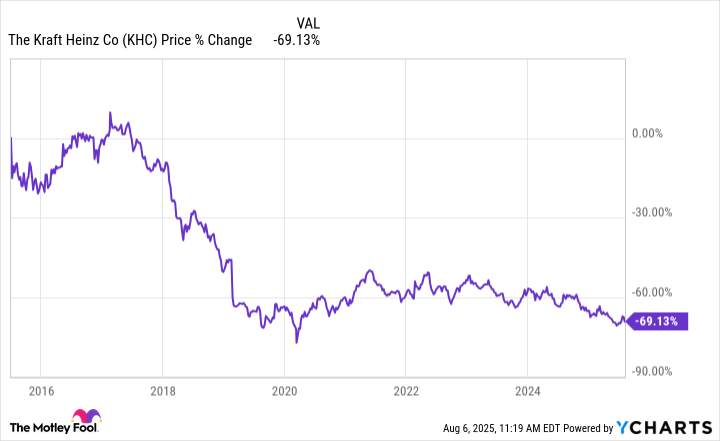Every quarter, investors eagerly wait for Berkshire Hathaway, the company run by Warren Buffett, to report changes in its massive stock portfolio. Investors are always interested to see what the greatest investor of all time and his team are buying and selling.
While Berkshire will report its 13F filing next week, detailing Berkshire's holdings at the end of the second quarter, investors already know some of the changes the large conglomerate made thanks to the company's earnings report and other filings. Berkshire recently took a multi-billion-dollar writedown on one of its longtime holdings and continued to pile into another deep value stock with a more than 5% dividend yield, as of this writing.
Preparing to sell a longtime underperformer
Buffett first got interested in the condiment and food company Kraft Heinz (KHC +1.43%) in 2013. Buffett and Berkshire teamed up with the private equity firm 3G to purchase Heinz for more than $23 billion. Two years later, the two companies once again worked together to merge Heinz with Kraft and form the Kraft Heinz known today. The investment has been a disaster.
It's widely viewed as one of Buffett's biggest mistakes. Kraft Heinz has been dogged by high debt and weak growth, as people opt for healthier options. With Buffett planning to step down as CEO of Berkshire later this year, the company looks like it's gearing up to potentially sell its position in Kraft Heinz, although it hadn't done so as of this writing.
Earlier this year, Berkshire's representatives on Kraft Heinz's board of directors announced they would leave the board. Kraft Heinz is exploring strategic alternatives, including a break-up of the company that could spin off the grocery business and focus on the faster-growing condiments division.

NASDAQ: KHC
Key Data Points
In the second quarter, Berkshire marked down its position in Kraft Heinz by nearly $5 billion, or $3.8 billion after tax. The company is a top 10 stock in Berkshire's portfolio, and Berkshire owns 27.5% of outstanding shares. Berkshire said in its Q2 regulatory filing that "we considered our ability and intent to hold the investment (Kraft Heinz) until the fair value exceeds carrying value, the magnitude and duration of the decline in fair value, and the operating results and financial condition of the company."

Image source: The Motley Fool.
Berkshire also attributed the mark down to the fact that it no longer has board members, which limits the timing and extent of financial information Berkshire can get from Kraft Heinz, beyond what's made public. It certainly seems like Berkshire is planning to unwind its position, although that could take time, given how large it is.
Loading up on this deep value turnaround story
While Berkshire looks to be preparing to exit one turnaround play, it is loading up on another. Regulatory filings showed that Berkshire continued to add to its position in Sirius XM (SIRI 1.20%), purchasing more than $100 million of the stock recently. That brings Berkshire's position in Sirius to $2.6 billion, or roughly 37% of outstanding shares.
Although Buffett has likely given the green light on the position, Sirius is a position believed to be managed by one of Berkshire's top investing lieutenants, Ted Weschler. The stock has also been a disaster and is down roughly 65% over the last five years. Sirius is the owner of Sirius Satellite Radio and the Pandora music streaming service.

NASDAQ: SIRI
Key Data Points
Sirius is the only company in the U.S. that holds a license from the U.S. Federal Communications Commission allowing it to operate a satellite radio business and use the radio spectrum. This should give Sirius a monopoly. However, the license has done little to prevent competitors like Spotify from encroaching on its business.
Sirius does have a plan to rejuvenate subscriber growth. The company has purchased the exclusive advertising and distribution rights to many big-name podcasts, and plans to scale its advertising business.
Additionally, Sirius XM has updated its technology platform and tried to streamline its pricing and subscription plans. The long-term financial goal is to add 10 million subscribers and grow total subscribers to 50 million, while increasing free cash flow by about 50% to $1.8 billion.
While recent quarters have shown some progress, it's still too minimal to really convince investors that the turnaround is working. That said, the company's subscriber base is mostly in the U.S., making the company fairly immune to tariffs. Additionally, Sirius' dividend yield is more than 5% right now, so investors will be compensated for their time. The dividend also looks easily sustainable, given Sirius' trailing 12-month free cash flow yield of close to 14.5%.









